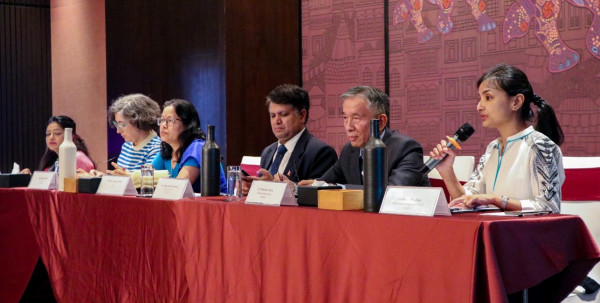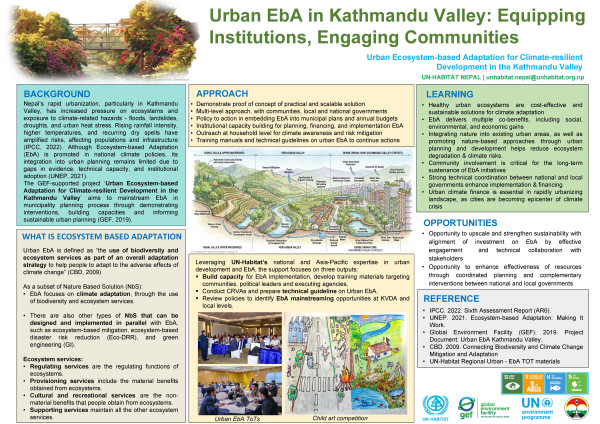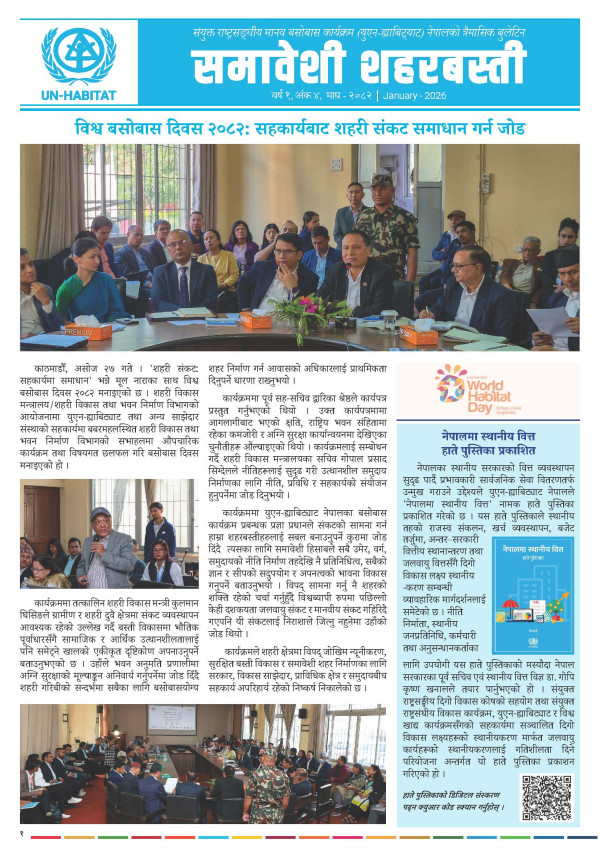World Habitat Day-2022: Inclusive Cities for Sustainable Urbanization in Nepal

World Habitat
Day was observed on 17th October 2022, in a 1-day event jointly organized by
Ministry of Urban Development (MOUD) and UN-Habitat through Nepal National
Urban Forum (NNUF) and key stakeholders. The theme was "Mind the Gap,
Leave No One and No Place Behind" to the problem of growing inequality and
challenges in cities and urbanization process of Nepal. The discussions during
the event aimed to highlight the issues of inequalities, hearing the
experiences of the marginalized, understanding the transversal benefits that
inclusion has for the whole society, and its outcomes.
The formal opening session was followed two Technical Sessions on:
- Best practices of the local government on mainstreaming LNOB
- Inclusive cities for sustainable urbanization. The encouraging presentations from the local government on their initiative to prioritize inclusivity followed by panel discussion representing various sector (Partners, CSO, Association, Academia) to highlighting challenges and way forward for making urbanization process inclusive and the key messages from the speakers were derived as inputs for initiating the review and revision of the GESI Guideline (2013) of MOUD, which has become critical in the current context of federal structure and evolving definition of GESI.
The event marked presence of about 100 urban stakeholders representing government officials, elected representatives, development partners, civil society, academia, private sectors, such as Ministry of Urban Development (MOUD), Department of Urban Development & Building Construction (DUDBC), Kathmandu Valley Development Authority (KVDA), Municipal Association of Nepal (MUAN), Town Development Fund (TDF), Regional & Urban Planners Association of Nepal (RUPSON), Society of Nepalese Architects (SONA), NNUF, Institute of Engineering (IOE), Nepal Housing Development Company, National Federation of the Disabled Nepal (NFDN), Development Partners like European Union, USAID, UN-Agencies, CSOs, media and experts.
Formal
Opening Session
Chief Guest Dr. Ramesh Prasad Singh, Secretary of MOUD emphasized
challenges such as poor infrastructure and services due to urbanization while
also the opportunities it offers. Likewise, he highlighted the government’s
initiatives including revision of National Urban Policy integrating pertinent
topics such as federalism, urban resilience, inclusivity, climate change and
SDGs and formulation of the Smart City Indicator of Nepal with inclusion parameters.
He accepted the challenges in its implementation and the action needed with
commitment of the government towards making inclusive cities.
Development Commissioner, KVDA Ms. Januka Dhakal, shared her
insights of inclusive cities by highlighting the fundamental rights of housing
enshrined in the constitution of Nepal and recognized that a city can be called
inclusive if it addresses social, political, economic, disability and
environmental inclusion. She also shared the action plans of inclusive city by
KVDA, which are yet to be accepted by the ministry for further implementation.
Mr. Padma Kumar Mainalee, Joint Secretary, MOUD shaded light
on his understanding of the theme “Mind the Gap” - on what causes the gap -
widening inequalities in housing and cities, settlement morphology that limits
access to infrastructures and services, that deprives a person from emotion of
self-reliance and identity. Likewise, he underscored the need of policy translated
through good practices to reduce the gap and inequalities in cities, where each
individual and organization should contribute their part to make an inclusive
city.
The
keynote speech was given by Ms. Sarita Maskey, Former Joint Secretary and GESI
and Urban Expert shared her concern on making current and future cities
accessible to people of all sections of society including children, women,
elderly and people with disability. She emphasized realization and will of
people a crucial factor for materialization of the concept of inclusive cities.
Mr. Bhim Prasad Dhungana, General Secretary of MUAN stressed
the need for planning of inclusive cities and effective implementation of the
plans and emphasized on inclusion of poor, marginalized and informal settlements
in the municipal planning process for inclusive outcomes.
Mr. Prakirna
Tuladhar Deputy Director of DUDBC
emphasized the role of national and local governments, NGOs and communities in implementation
of policies. He explained DUDBC’s work on improving the lives of citizens,
including the elderly, women, and the people with disability, through various
projects and programmes for implementing the provision of the Constitution and
SDGs.
Mr. Ram Chandra Dangal, Joint Secretary of MOUD focused on
the right to housing as one of the fundamental rights and the housing projects
for the marginalized and economically weaker sections, which includes Janata
Awas and the Surakshit Awas. Moreover, he stated that despite the positive
contribution the desired result could not be obtained due to funding limitation
and need for integrated resource mobilization, planning and implementation for
better results.
Technical Session 1: Best Practices of
the Local Government on Mainstreaming LNOB
The best practices of four local government were presented in
the session chaired by Mr. Bhim Prasad Dhungana, General Secretary, MUAN
(Mayor, Nilkantha Municipality) and facilitated by Mr. Kalanidhi Devkota,
Executive Director, MUAN.
Mr. Upendra Karki, Mayor of Kageshwori Manahara Municipality, presented the policy gap for Inclusive Urban Development, explained the addressal of inclusiveness through the Integrated Urban Development Plan (IUDP) of the municipality with five key issues addressed as follows:
- Physical Inclusion that focuses
on infrastructure construction.
- Social Inclusion that focuses on
quality living environment.
- Economic Inclusion that focuses
on economic development and job creation.
- Political Inclusion that focuses on governance.
- Cultural Inclusion that focuses
on embracing cultural diversity.
Mr. Bhim Prasad Dhungana, presented
on Inclusive Urban Governance introducing inclusive cities as a
multi-dimensional concept that focuses on improving the quality of life of
local citizens, especially marginalized and backward communities. He explained
the five pillars of Inclusive Urban Governance of Nilkantha Municipality:
policy, strategy, implementation, access, and capacity and how the municipality
has been working on inclusive development with policies, standards, sectoral
strategic plans, masterplans and effective disaster recovery through
partnership and inclusion of civil societies and stakeholders.
Mr. Nirajan Jangam, Deputy Mayor of Dhulikhel presented inclusive WASH highlighting efforts on accessible drinking water, sanitation, and hygiene for all. He highlighted one house one tap policy; public-private partnership on SWM; GESI strategies; policy for smoke-free enterprises; establishment of Disability, Women, Tribal, Youth, Dalit Council based on municipal procedure of 2018; and collaboration with UN-HABITAT in implementation of "Mainstreaming LNOB in National and Urban policies" in Dhulikhel municipality. He concluded with a vision for future of a disable-friendly city through accessible infrastructures and promoting accessible tourism.
Ms. Mina Kumari Lama, Mayor of Hetauda Sub Metropolitan city, highlighted the efforts on ensuring
GESI in the urban planning process especially for women, elderly population,
children, disabled through friendly and effective local governance. Ms. Lama
highlighted targeted initiatives, municipal services and awareness programs
against gender based and sexual violence and sexual abuse, ethnic
untouchability and on marginalized communities. Similarly, she highlighted
approach of economic empowerment to foster equality with programs targeting
youth, and marginalized communities, targeting Dalit and single women.
Technical Session 2: Panel Discussion
on Inclusive Cities for Sustainable Urbanization
The session was introduced and moderated by Ms. Pragya
Pradhan, Habitat Program Manager, UN-Habitat, Nepal, and Chaired by Mr. Padma
Kumar Mainalee, Joint Secretary of MOUD.
Ms. Eloisa Astudillo from European Union highlighted GRID –
Green Resilient Inclusive Development as a way forward to address the complex
issues of urbanization, climate change and its interaction. Nepal being fastest
urbanizing country with more people vulnerable, she added three important entry
points in urban development as Disaster risk; Public spaces; and Mobility. She
urged that many people don’t consider ‘walking’ as a mode of transportation,
but in the context of Nepal 90% - 95% of the people walk in the city, and planning
should therefore consider safety and comfort for them. She further highlighted
the need to derive solutions innovatively as there is no perfect solution that
fits all the urban issues.
Ms. Rama Dhakal, Vice-President of NFDN, elaborated on diversity
in disability and the difficulties faced by them during disasters and pandemics,
in accessing right information and timely support. She also shared her challenges
and experience of navigating the city on a daily basis through public
transportation and streets. While she praised initiatives as accessible public
toilets construction, public transport, she strongly suggested disability
mainstreaming in all aspects of development.
Prof. Dr. Sangeeta Singh, Convenor of Nepal National Urban
Forum (NNUF) and Professor at IOE, stressed on the planning approach in Nepal mainly
focusing on the physical infrastructure and lacking emphasis on social needs,
economic progress, and social protection. She explained gender stereotypes on
every sector starting from home and families to universities and
decision-making platforms that can only be improved by targeting women's
economic participation and providing access to women in fields of education,
health, and political power. Dr. Singh further stated the preparation of Gender
Action Plan in the IOE and the need to mainstream GESI in curriculum for
early-age grooming sensitization of all.
Dr.
Mahendra Subba, President RUPSON, focused on the informal economy, gender disparity,
exclusion and geographical disparity in human development index, indicated by
health and education services due social, cultural and historical
marginalization in Nepal. Further citing example of Biratnagar Metropolitan
City, he highlighted imbalanced urbanization reflected in spatial disparity
between in neighboring palikas and increasing urban poverty and informal
economy, which could be addressed through the fundamental rights enshrined in
the Nepalese constitution. He concluded by suggesting that if one dreams of
inclusive cities, planning must be done at the national level and mainstreamed
strongly in plans and programmes and not be seen as responsibility of the
municipal government.
Mr. Bruno Dercon, Regional Director of UN-HABITAT Regional
Office for Asia and the Pacific (ROAP) Japan, in his opening and closing
remarks elaborated on the need for adoption of innovative tools to make cities
inclusive and felt by the citizens in day-to-day life in both rural or urban
areas. He also stressed on the need of multi-dimensional inclusion approach –
physical, socio-cultural, environmental - and suggested three local actions
priorities: accessible public spaces, accessible mobility and equal economic
opportunities, that can translate into greater access to benefit of all. Mr.
Dercon further acknowledge the good practices by the municipalities and the
need for strategically recognizing and building confidence of the local women
leadership and encouraged the mayors to set a goal to be nominated for Scroll
of Honor, provided by UN-Habitat in the coming days.
(Compiled by: Ar. Anuska Singh, Ar. Barsha Shrestha, Ar. Srijana Koirala, and Photo Credit: Hari Jung Thapa/UN-HABITAT Nepal)





